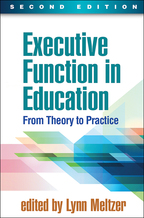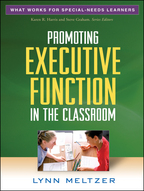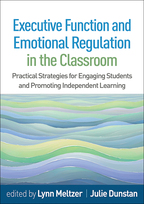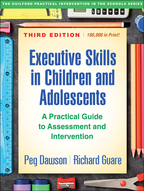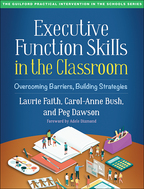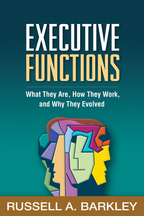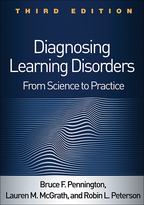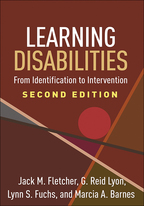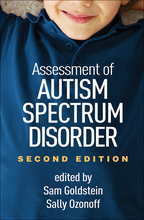Executive Function in Education
Second Edition
From Theory to Practice
Edited by Lynn Meltzer
HardcoverPaperbacke-bookprint + e-book
Hardcover
orderFebruary 19, 2018
ISBN 9781462534555
Price: $71.00 396 Pages
Size: 6" x 9"
Paperback
orderFebruary 20, 2018
ISBN 9781462534531
Price: $47.00396 Pages
Size: 6" x 9"
“Provides educational stakeholders with advanced and comprehensive information describing the biological and environmental underpinnings for executive function abilities and difficulties….In addition to intervention considerations embedded within each chapter, the book concludes with a focus on specific, practical, and manageable school-based interventions. Overall, Meltzer did an excellent job balancing theoretical knowledge and practical recommendations….This book is recommended to school psychologists and educators alike who seek to gain a deeper understanding of various executive function processes and an increased ability in addressing such demands.”

—NASP Communiqué
“Meltzer—a pioneering, visionary researcher—is joined by a who’s who of EF experts in this second edition, which includes valuable updates and new chapters. Graduate students and experienced educators will benefit equally from the breath and scope of this book. If you were going to purchase only one volume on the topic of EF in education, it should be this second edition.”

—Sam Goldstein, PhD, Department of Psychiatry, University of Utah School of Medicine; Clinical Director, Neurology, Learning, and Behavior Center
“Although the term 'executive function' is now widely used, there is still considerable confusion about its meaning and practical implications. In this outstanding second edition of Executive Function in Education, Meltzer has brought together important theories and recent research. Intervention-focused chapters offer helpful guidance on how EF knowledge can inform more effective instructional strategies in reading, writing, and math.”

—Thomas E. Brown, PhD, private practice, Manhattan Beach, California; Department of Psychiatry and Behavioral Sciences, Keck School of Medicine, University of Southern California
“The second edition of this indispensable volume is replete with practical guidance and current evidence-based best practices to assist educators in improving students’ abilities to manage time, monitor behavior, and employ strategies to help with organization and planning. The book presents various theoretical perspectives and explores how EF is related to cognitive abilities such as working memory and processing speed, as well as the impact of EF processes on reading, writing, and math development. Contributors provide up-to-date guidance on how to adapt instruction, improve self-regulation skills, and incorporate new digital tools to promote success in school and beyond.”

—Nancy Mather, PhD, Department of Psychoeducational Studies, University of Arizona
“The book clearly describes the sometimes confusing theories of EF and the recent research that supports them. Contributors present practical strategies for improving EF grounded in these theoretical constructs. This book is a 'must have' for professionals who evaluate, treat, and teach students with varying learning needs, as well as those in training. The volume offers real-life illustrations of the daily EF challenges that students experience and provides explicit examples of classroom strategies that are easily incorporated into lesson plans.”

—Eric Q. Tridas, MD, developmental pediatrician, Tridas Center for Child Development, Tampa, Florida
—NASP Communiqué
“Meltzer—a pioneering, visionary researcher—is joined by a who’s who of EF experts in this second edition, which includes valuable updates and new chapters. Graduate students and experienced educators will benefit equally from the breath and scope of this book. If you were going to purchase only one volume on the topic of EF in education, it should be this second edition.”
—Sam Goldstein, PhD, Department of Psychiatry, University of Utah School of Medicine; Clinical Director, Neurology, Learning, and Behavior Center
“Although the term 'executive function' is now widely used, there is still considerable confusion about its meaning and practical implications. In this outstanding second edition of Executive Function in Education, Meltzer has brought together important theories and recent research. Intervention-focused chapters offer helpful guidance on how EF knowledge can inform more effective instructional strategies in reading, writing, and math.”
—Thomas E. Brown, PhD, private practice, Manhattan Beach, California; Department of Psychiatry and Behavioral Sciences, Keck School of Medicine, University of Southern California
“The second edition of this indispensable volume is replete with practical guidance and current evidence-based best practices to assist educators in improving students’ abilities to manage time, monitor behavior, and employ strategies to help with organization and planning. The book presents various theoretical perspectives and explores how EF is related to cognitive abilities such as working memory and processing speed, as well as the impact of EF processes on reading, writing, and math development. Contributors provide up-to-date guidance on how to adapt instruction, improve self-regulation skills, and incorporate new digital tools to promote success in school and beyond.”
—Nancy Mather, PhD, Department of Psychoeducational Studies, University of Arizona
“The book clearly describes the sometimes confusing theories of EF and the recent research that supports them. Contributors present practical strategies for improving EF grounded in these theoretical constructs. This book is a 'must have' for professionals who evaluate, treat, and teach students with varying learning needs, as well as those in training. The volume offers real-life illustrations of the daily EF challenges that students experience and provides explicit examples of classroom strategies that are easily incorporated into lesson plans.”
—Eric Q. Tridas, MD, developmental pediatrician, Tridas Center for Child Development, Tampa, Florida

